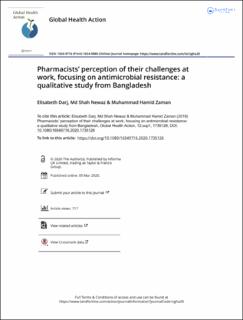| dc.contributor.author | Darj, Elisabeth | |
| dc.contributor.author | Newaz, MdShah | |
| dc.contributor.author | Zaman, Muhammad Hamid | |
| dc.date.accessioned | 2020-09-07T12:15:12Z | |
| dc.date.available | 2020-09-07T12:15:12Z | |
| dc.date.created | 2020-06-24T11:03:07Z | |
| dc.date.issued | 2020 | |
| dc.identifier.issn | 1654-9716 | |
| dc.identifier.uri | https://hdl.handle.net/11250/2676682 | |
| dc.description.abstract | Background: The indiscriminate use of antimicrobial medicines has contributed to the development of microorganisms’ resistance to antibiotics. Antimicrobial resistance (AMR) is a major global health problem and is most acute in countries that have a weak health care and regulatory system and a high burden of infectious diseases, such as Bangladesh. Due to shortages of physicians available to diagnose and prescribe appropriate antibiotics, people with ailments in Bangladesh are forced to contact various types of health care services, including retail pharmacies, that lack supervision by qualified medical personnel. It is unknown how pharmacists perceive the AMR situation and the related challenges they face.
Objective: The aim of the study was to understand retail pharmacist’s perceptions regarding AMR.
Method: A qualitative study design was used, and in-depth interviews were held with retail pharmacists in Dhaka.
Results: The participants demonstrated a variety of concerns regarding AMR. They considered that self-medication, old prescriptions, lack of regulations and supervision, and readily available antibiotics were the main factors that contributed to the misuse of antimicrobial medicines and the development of AMR.
Conclusions: To control the further spread of AMR in Bangladesh, there is a need to work at several levels of the health system simultaneously. Initiatives could include establishment of the ‘Model Pharmacy’ programme nationwide, increasing and widening the focus on AMR in pharmacists’ education, ensuring the implementation of government guidelines on AMR, increasing public awareness of the consequences of antimicrobial use, and surveillance and monitoring of regulations and progress. A multipronged strategy is necessary not only for better AMR control but also for investment in a system that is well equipped to provide equitable care in the face of both existing and new health challenges. | en_US |
| dc.language.iso | eng | en_US |
| dc.publisher | Taylor & Francis Open Access | en_US |
| dc.rights | Navngivelse 4.0 Internasjonal | * |
| dc.rights.uri | http://creativecommons.org/licenses/by/4.0/deed.no | * |
| dc.title | Pharmacists’ perception of their challenges at work, focusing on antimicrobial resistance: a qualitative study from Bangladesh | en_US |
| dc.type | Peer reviewed | en_US |
| dc.type | Journal article | en_US |
| dc.description.version | publishedVersion | en_US |
| dc.source.volume | 12 | en_US |
| dc.source.journal | Global health action | en_US |
| dc.identifier.doi | 10.1080/16549716.2020.1735126 | |
| dc.identifier.cristin | 1816906 | |
| dc.description.localcode | © 2020 The Author(s). Published by Informa UK Limited, trading as Taylor & Francis Group.This is an Open Access article distributed under the terms of the Creative Commons Attribution License (http://creativecommons.org/licenses/by/4.0/) | en_US |
| cristin.ispublished | true | |
| cristin.fulltext | original | |
| cristin.qualitycode | 1 | |

